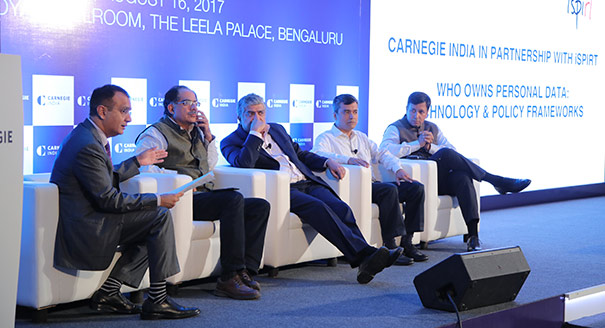Registration
You will receive an email confirming your registration.
Internet adoption has increased rapidly in India, propelled by an exponential increase in smart phone users with access to faster and cheaper Internet. Government initiatives like Digital India have been instrumental in articulating a policy push for greater Internet access and e-governance. However, this increasing connectivity has raised fundamental questions about data ownership and user privacy that have not been adequately addressed in current legal and policy frameworks.
Carnegie India, in partnership with the iSPIRT Foundation, hosted a seminar to address these questions. The seminar included Nandan Nilekani, the former chairman of Unique Identification Authority of India, followed by a presentation by the iSPIRT Foundation, and a panel discussion between Nandan Nilekani, Rahul Matthan, partner at Trilegal, Sharad Sharma, cofounder of the iSPIRT Foundation, and C.V. Madhukar, investment partner with Omidyar Network. The discussion was moderated by Shivnath Thukral, managing director at Carnegie India.
Discussion Highlights
- New Approaches to Data Protection: Participants discussed the fact that user data is currently being held in silos, controlled primarily by major Internet companies or service providers. They argued that the concept of data inversion, which would allow individual consumers to have complete control over their data, would break these barriers by allowing individuals to share their data with any service provider of their choice.
- A Democratic Approach to Data Access: Participants agreed that India will become a data-rich country in the near future, which, they said, should be leveraged to induce economic growth. They said that a democratic approach to data access would involve making user data accessible to a larger number of stakeholders. This, they argued, can be achieved in three ways. The first, they said, would be to restrain government control over public data by extending its management to the public. Next, they argued, would be to establish protocols and formats on how data should be released from regulated markets such as insurance, investments, bank statements, etc. Finally, they stated that private entities such as healthcare units should be legally bound to ensure individual demands about handling personal data are matched.
- Technological Framework for Data Protection: The participants proposed a model that could implement a democratic approach to data ownership, which they labeled the Electronic Data Consent (EDC) framework. The users, according to the participants, are central to this framework. This, they said, would enable individuals to share their personal data with a variety of service providers. The participants argued that the EDC framework can be audited, which they asserted, allows for greater monetization of data suitable for individuals.
- Policy Framework for Data Protection: All participants agreed that India must strategically approach the subject of data. Therefore, they argued, policies should consider the evolving nature of data and data usage. The participants emphasized that data-protection models adopted in other countries, if they were to be applied in India, would need to be contextualized accordingly. Some participants asserted that user consent in policy frameworks must be highlighted, and others argued that focusing on consent might be limiting, recommending instead the idea of building robust accountability mechanisms to withstand breaches of data privacy. Participants also asserted the need for raising public awareness on best practices in privacy and data protection.
Photos from the event
Agenda
9:15 a.m.
Registration
10:00 a.m.
Embracing Data Democracy
- Nandan Nilekani | presentation
11:00 a.m.
Electronic Data Consent: A Model for Sharing Data and Managing Privacy
- Sanjay Jain
12:00 p.m.
Data Ownership, Usage, and Privacy in India
- Nandan Nilekani
- Rahul Matthan
- Sharad Sharma
- Moderator: Shivnath Thukral
Speakers
Nandan Nilekani
Nandan Nilekani is the former chairman of Unique Identification Authority of India.
Sanjay Jain
Sanjay Jain is chief innovation officer at the Centre for Innovation, Incubation and Entrepreneurship at the Indian Institute of Management – Ahmedabad.
Sharad Sharma
Sharad Sharma is the cofounder and a governing council member of the iSPIRT Foundation.
Rahul Matthan
Rahul Matthan is a partner at Trilegal.
Shivnath Thukral
Shivnath Thukral is the managing director of Carnegie India.






